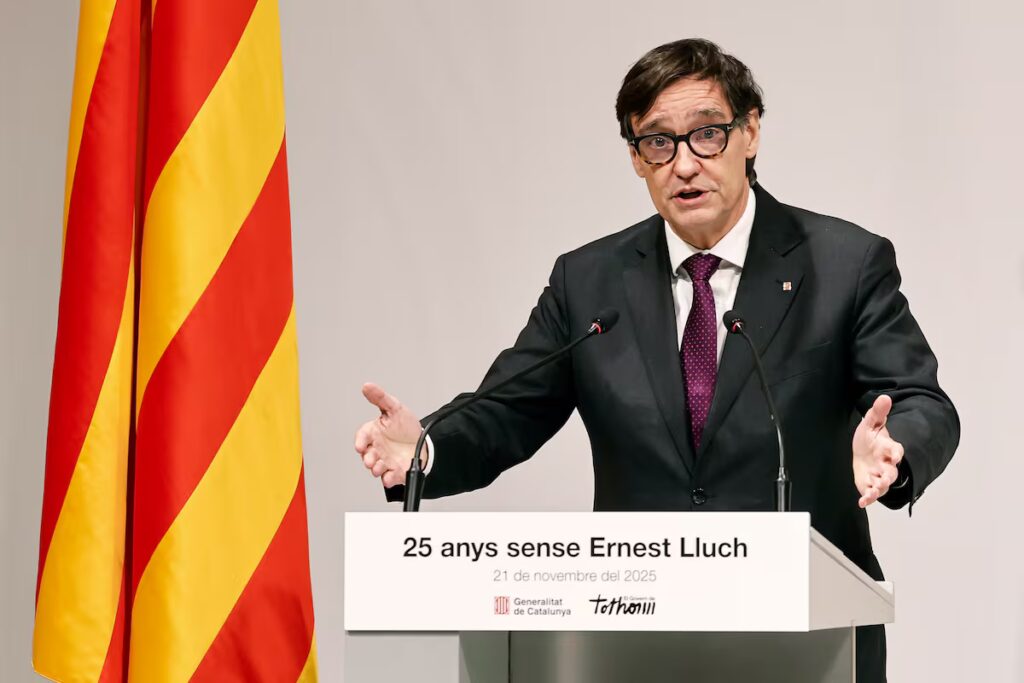
Telefónica and Cellnex have contested the controversial award of the contract for the development of a fiber optic network, called XCAT. This project aims to be the basis of the future public telecommunications operator of Catalonia and was granted by the Generalitat to the Temporary Union of Companies (UTE) composed of Sirt and Connecta, which will use equipment from the Chinese manufacturer Huawei, according to the resolution published by the Public Procurement Platform of the Generalitat of Catalonia to which EL PAÍS had access.
It is expected that the filing of this appeal before the Public Contracts Court of Catalonia by the two related companies that participated in the tender will lead to the temporary paralysis of the process of formalizing the contract with the UTE of Sirt and Connecta. The proposal presented by Telefónica and Cellnex was the only one that opted for equipment from the Finnish supplier Nokia. The other three competing offers, including MasOrange and Vodafone, based their proposals on the use of the Chinese giant’s technology for the development of this large fiber network.
The choice of Sirt, with the notable presence of Huawei in its offer, takes place in a context in which the European Commission has repeatedly reiterated – the last time just under a week ago responding to questions from the Popolare group – the need to limit the presence or even completely exclude the Chinese supplier from European telecommunications infrastructures, due to the potential security risk due to its links with the Chinese government.
Furthermore, the European Union is stepping up efforts for member states to limit the use of Chinese hardware in telecommunications networks – mainly from Huawei and China’s ZTE – with the intention of turning the current recommendation into a binding ban. This total ban would not be limited, as so far, to 5G mobile networks, but would also extend to fixed fiber networks (FTTH) and large backbone networks. If this initiative resulted in a total ban on fixed and mobile telephony, the new community legislation would have a direct impact on the legality of this prize.
Technical advantage
The proposal from Sirt and Connecta, two smaller companies, emerged as the winner in the tender announced by the Generalitat chaired by Salvador Illa, obtaining a total score of 97.51 points, beating the four main operators on the Spanish market: Telefónica (in alliance with Cellnex), MasOrange-Parlem and Vodafone.
The technical advantage obtained by Sirt proved to be decisive, despite the fact that the most economically valued offer was that of Telefónica-Cellnex. The points of superiority of the Sirt proposal in the technical evaluation were enough to prevail in the final result, which reached 97.51 points, against the 96.22 of Telefónica-Cellnex, the 90.72 of Orange-Parlem and the 88.94 of Vodafone-SEMI.
Critical public services
The victory of Sirt’s bid implies the use of Huawei equipment in an essential infrastructure network, which will provide connectivity to critical public services such as the regional police, the entire education system (public schools and universities), courts and emergency services.
The victory of the joint venture Sirt and Connecta in The CTTI awarded Sirt 40 points in the technical category, against 36.22 for Telefónica-Cellnex, 34.20 for Masorange and 33.33 for Vodafone Spain. It is surprising that most of the infrastructure and services that will replace this new XCAT network currently belong to Telefónica, despite the fact that the CTTI considered that it did not present a sufficiently competitive offer.
Three of the four offers, with Huawei
However, the greatest interest of this competition lies in the origin of the technology that will support this very important network. Of the four proposals, three selected the Chinese group Huawei as the main supplier of equipment and systems, a company that has recently been at the center of several controversies related to contracts with the Central Administration of Pedro Sánchez’s Government.
The controversy that arose when it became known that Catalonia’s critical network would be built with Huawei hardware forced the Generalitat to make a clarification. In a statement, the regional government specified that: “as regards the debate on a potential exclusion of Chinese equipment from the offers for this project, the applicable legislation does not allow it. It should be remembered that the law on public sector contracts establishes the obligation to guarantee the principles of freedom of access to tenders, publicity and transparency of procedures, as well as non-discrimination and equal treatment between bidders, safeguarding free competition. EU Recommendation 2019/534 of the Commission of 26 March 2019 on cybersecurity of 5G networks is not applicable to this project, as it is not a 5G network.”
Beyond the economic aspect, the XCAT project is fundamental for its strategic value. It has a base budget of 127 million euros plus VAT (approximately 154 million), a significant part allocated to equipment, and is conceived as the embryo of the Generalitat’s future public telecommunications company.
This program involves the creation of a backbone network and its own fiber accesses to interconnect a total of 5,419 public body offices, many of which are critical in terms of security and confidentiality of the information that will circulate through the network. The infrastructure will connect: 120 security forces headquarters (including 78 Mossos d’Esquadra police stations); 100 judicial offices; 180 fire stations and emergency medical services; 812 hospitals and health centers; and 2,381 educational centers of all levels.
This network aims to progressively replace Telefónica, which currently connects 5,150 offices of the Generalitat. The plan is that by 2031 the Generalitat will have a public network that will give it total independence from the networks of Spanish operators.
Controversial appointment
A further factor that has fueled the controversy is the professional connection of the CTTI manager. Thus it happens that Demetri Rico, director of the CTTI – the body of the Generalitat dependent on the Secretariat of Telecommunications directed by Albert Tort and directly responsible for
The controversy intensified when it came to light that the central government awarded Huawei a contract to archive judicially ordered police wiretaps, a decision that drew criticism in Europe and, in particular, from the Trump administration. Another point of tension was the recent cancellation of another contract awarded to Huawei for the modernization of the IRIS network, which connects most of the country’s public academic and research centers.





